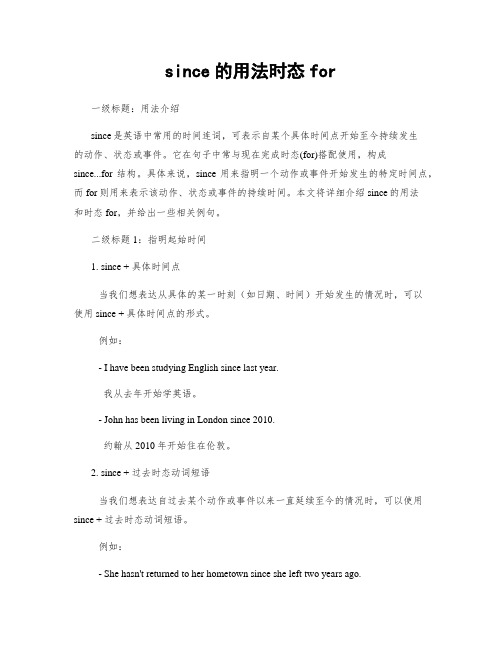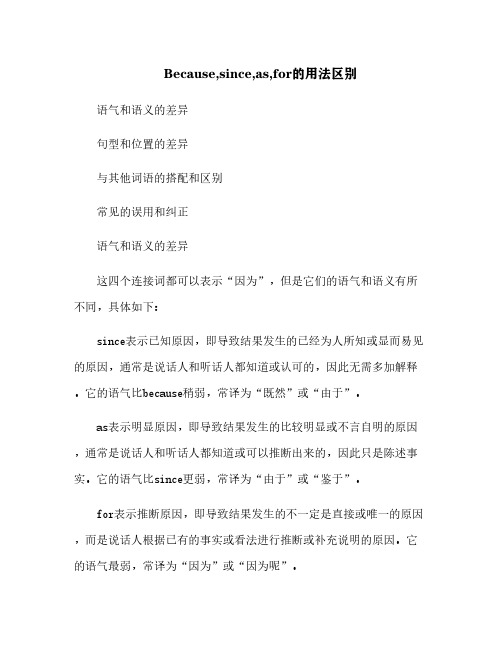Since 和 for 的用法及区别
- 格式:doc
- 大小:61.00 KB
- 文档页数:12

for +一段时间表示时间的持续 强调一段时间 have / has been + doing sth + since +过去的时间点 表示“自从过去某一时间 点以来” 强调动作或状态一直延续到现在 since + 从句 (一般过去时) 表示从过去开始一直持续到现在的动作,并有可能持续下去.与过去时的比较:1.I watched TV for three hours.我看了三小时的电视.(我现在没有看电视了)2.I have been watching TV for three hours. 我看了三小时的电视.(我现在仍然在看电视)一.用for 或者since 填空。
填空。
1.They have been learning Chinese since they came to China. 2. I haven’t seen her ___for __ a long me. 3. He has been living here _since____ 2001. 4. She has been doing her homework __for__two hours. 5. It’s 5 years __since___ we le school. 6. – How long has Mary been a teacher? – __since___ two years ago. 7.I have been prac cing the piano _since ___ 10:30. 8.Maricia has been running __for__ 15 minutes. 9.Sarah has been sleeping ___since__ 9:00. 10.Dale has been talking on the phone __for___5 minutes. 11.Louie has been studying Chinese __since__ he was 6 years old.. 12.I have been watching you __for__10 minutes. 二.单项选择题。

because,since,as和for的区别因为、since、as、for这几个词都是表示原因的连词,它们的语气由强至弱依次为:because→since→as→for。
其中,because、since、as均为从属连词,引导原因状语从句;而for是并列连词,引导并列句。
因为表示直接原因,它所指的原因通常是听话人所不知道的,其语气最强。
常用来回答why的提问,一般放于主句之后,也可以单独存在。
例如:1)因为下雨,我呆在家里。
2)XXX因病,没有上学。
3)她为什么缺席?因为她病了。
此外,在强调句型中,只能用because。
例如:4)我上学迟到是因为我没有赶上早班汽车。
Since侧重主句,从句表示显然的或已为人所知的理由,常译为“因为”、“既然”,语气比because稍弱,通常置于句首,表示一种含有勉强语气的原因。
例如:1)既然他问你了,你就告诉他为什么吧。
2)既然大家都到齐了,我们就出发吧!3)我日语懂得不多,因而听不懂对话。
As是常用词,它表示的原因是双方已知的事实或显而易见的原因,或者理由不是很重要,含义与since相同,但语气更弱,没有since正式,常译为“由于,鉴于”。
从句说明原因,主句说明结果,主从并重。
例如:1)我们都喜欢她,因为她善良。
2)因为我感冒了,所以没去上课。
以上就是关于because、since、as、for这几个连词表示原因的用法和区别的介绍。
As Xiaowang was unprepared。
we had to leave without him.XXX "for" is similar to "because," but it often provides n that has not been ned in the us context。
"For" does not indicate a direct cause。

sincefor的用法区别一、since 和 for 的基本用法since 和 for 都是表示时间段的介词,但在使用上有些差异。
首先,我们先来看看 since 的用法。
1. Since 的含义和用法"Since" 在英语中表示一个起点时间或自从某个时间以来的连续时间段。
它常常与具体的时间点或事件相关联,并且强调从那个特定的时间开始直到现在的经过的时间。
例如:- I haven't seen him since yesterday.(我昨天没见过他)- We've been good friends since we were kids.(我们从小就是好朋友)注意:- "since + 过去时态"表示动作或状态开始于过去并延续至今。
- "since + 现在完成时态"表示动作或状态开始于过去某个时间点,并延续到了当前。
- 句子主语通常是“I”, “we”,“they” 等第一人称。
2. For 的含义和用法"For" 表示一个持续的时间段,它强调动作发生了多长时间。
它通常与非具体的持续性词组,如一段时间或数量词连用,而不涉及具体的起止时间点。
例如:- I have been studying English for five years.(我学习英语已经五年了)- They have lived in this city for a long time.(他们在这个城市住了很长时间)注意:- "for + 一段时间"表示动作或状态持续了多长时间。
- 句子主语可以是任何人称。
二、since 和 for 的区别1. 区别一:表达的时间范围不同"since" 强调从特定时间点开始持续至今,而且通常与过去的一个具体事件或完成时态连用。
而 "for" 强调持续的时间段,并且通常与一段时间或数量词连用。

since的用法时态for一级标题:用法介绍since是英语中常用的时间连词,可表示自某个具体时间点开始至今持续发生的动作、状态或事件。
它在句子中常与现在完成时态(for)搭配使用,构成since...for结构。
具体来说,since用来指明一个动作或事件开始发生的特定时间点,而for则用来表示该动作、状态或事件的持续时间。
本文将详细介绍since的用法和时态for,并给出一些相关例句。
二级标题1:指明起始时间1. since + 具体时间点当我们想表达从具体的某一时刻(如日期、时间)开始发生的情况时,可以使用since + 具体时间点的形式。
例如:- I have been studying English since last year.我从去年开始学英语。
- John has been living in London since 2010.约翰从2010年开始住在伦敦。
2. since + 过去时态动词短语当我们想表达自过去某个动作或事件以来一直延续至今的情况时,可以使用since + 过去时态动词短语。
例如:- She hasn't returned to her hometown since she left two years ago.自两年前离开后,她就没有回过家乡。
- They have been good friends since they met in college.自从大学相识以来,他们一直是好朋友。
二级标题2:表示持续时间1. for + 时间段很多情况下我们需要表达一个动作或事件持续了多久,这时可以使用for + 时间段。
例如:- I have been working in this company for five years.我在这家公司工作已经五年了。
- We have lived in this city for a decade.我们在这个城市生活已经十年了。

Because,since,as,for的用法区别语气和语义的差异句型和位置的差异与其他词语的搭配和区别常见的误用和纠正语气和语义的差异这四个连接词都可以表示“因为”,但是它们的语气和语义有所不同,具体如下:since表示已知原因,即导致结果发生的已经为人所知或显而易见的原因,通常是说话人和听话人都知道或认可的,因此无需多加解释。
它的语气比because稍弱,常译为“既然”或“由于”。
as表示明显原因,即导致结果发生的比较明显或不言自明的原因,通常是说话人和听话人都知道或可以推断出来的,因此只是陈述事实。
它的语气比since更弱,常译为“由于”或“鉴于”。
for表示推断原因,即导致结果发生的不一定是直接或唯一的原因,而是说话人根据已有的事实或看法进行推断或补充说明的原因。
它的语气最弱,常译为“因为”或“因为呢”。
举例说明:I stayed at home because itrned.(我呆在家里是因为下雨了。
)这里because表示下雨是我呆在家里的直接原因,可能是听话人不知道下雨了,所以需要解释。
Since you are so busy, I won't bother you anymore.(既然你这么忙,我就不再打扰你了。
)这里since表示你很忙是我不再打扰你的已知原因,可能是说话人和听话人都知道你很忙,所以无需多说。
As he is a teacher, he knows alot.(由于他是老师,他知道很多。
)这里as表示他是老师是他知道很多的明显原因,可能是说话人和听话人都认为老师知道很多,所以只是陈述事实。
He must be ill, for he lookspale.(他一定生病了,因为他看起来很苍白。
)这里for表示他看起来很苍白是他生病了的推断原因,可能是说话人根据他苍白的面色进行推测或补充说明。
句型和位置的差异这四个连接词在句型和位置上也有一些差异,具体如下:because为从属连词,引导原因状语从句,从句可以放在主句之前或之后,但如果放在主句之前,则要用逗号隔开;如果单独存在,则要用冒号引出。

现在完成时二用法:过去完成时表示过去发生的动作或存在的状态一直持续到现在(包括现在在内),常与for和since引导的时间状语连用,动词需要用延续性动词。
如:Mr.Green has been in China for 10 years .(格林先生来中国10年了)The film has been on for 20 minutes.(电影开始已经20分钟了)Since 与for的区别:for后面跟一段时间如:for three days for 2 years 等+ 过去的时间点:since 2004Since+ 一段时间ago :since two minutes ago+ 过去时的句子:since I came to this school用since 和for 填空:1.I have kept the book _______ a week , I must return it on time .2.We have learned English _______ 5 years ago, so we have learned it ______ 5 years.3.Miss Li has taught maths ________ she came to this school ..4.I have had a cold _______ yesterday.5.The workers have worked _______ 10 hours . They are very tired.6.Great changes have taken place in China ______ it was founded.7.Our teacher has studied Japanese ______ three years.8. She has been away from the city ______ about ten years.9.. It’s about ten years __________ she left the city.短暂性动词的完成时态不能和表示一段的时间状语连用,当它需要与表示一段时间的时间状语连用时,通常需进行转化,见书119页。
since, for, because, as, now that 表原因的用法区别in that通常用now that,是既然的意思。
since,for,because,now that的用法和区别:(既然)语气较弱,强调已知的事实。
例:Since you can't answer the question, I'll ask someone else.既然你回答不出这个问题,我就问别人了。
2. for(因为)的用法:for是并列连词,表示推断的原因,或对前一分句补充说明理由。
例:It must be morning for the birds are singing.一定是清晨了,因为鸟儿在叫。
3. because (因为)的用法:…because通常表示直接的原因。
because引导的从句表示直接而明确的原因和理由,表示按因果关系的推断,语气很强,用来回答why的问题, 一般位于主句之后。
例:We couldn't go out because it was too cold. 因为天气太冷,我们不能外出。
4. now that(既然)的用法:now that同since相似,语气较弱,强调人们已知的事实。
例:Now that you are busy, let me do it for you.既然你忙,就让我给你做吧。
5. as意为“因为、由于”,语气比because弱,所引导的从句表示的是不言而喻、显而易见的原因和理由,其从句一般放在主句前,如:As it was late ,we came back soon.(由于时间很晚了,我们很快就回来。
)区别:since和now that,表示事物发展的自然结果,特别是当对方大概已经了解其原因的情况下使用,表示既成事实的原因一般位于主句之前。
注意:for是并列连词,引出的原因较间接,似乎是事后所想到的补充解释的理由,只陈述一般推断的理由,不一定表示产生结果的必然原因,主要放在两个并列句之间。
since和for的用法口诀
1. “Since 时间点呀,要记牢,就像火车有个起始站。
比如说 Since 1990,那就是从 1990 年开始呢!”
2. “For 时间段哟,别弄混,好像一段长长的旅程。
像 for two hours,就
是长达两个小时呀!”
3. “哎呀呀,since 后面跟时间点,这很关键呀!就好比你从哪一天开始踏上征途,since yesterday,从昨天起呀!”
4. “for 就是一段时间啦,多形象!for a week,这不就是一个星期那么长的时间嘛!”
5. “since 一出现,时间点就在那哟,想想 since last year,不就是从去年开始嘛,多简单!”
6. “for 在这里,时间段稳稳的,for several days,好几天呢,你记住了没!”
我觉得记住这些用法口诀,对大家正确使用 since 和 for 会很有帮助呢!。
⽤于现在完成时的since和for
⽤于现在完成时的since和for
到⽬前为⽌,我们已经知道现在完成时可以表⽰某⼀⾏为或状态从过去某时间⼀直持续到现在,这时常与表⽰⼀段时间的时间状语连⽤。
这类时间状语通常由since或for引导,具体⽤法如下:
1. since意为“⾃……以来”,既可作介词⼜可作连词。
作介词时,后接时间点;作连词时,引导时间状语从句,主句常⽤现在完成时,从句⽤⼀般过去时。
如:
Linda has lived in the town since 2003.
My father has been away from his home town since he was a child.
2. for作介词,后接⼀段时间。
如:
Tim has already studied Chinese for four years.
3. 对现在完成时的时间状语提问时,常⽤how long。
如:
—How long have you worked in this company?
—For six years. / Since six years ago.
【注意】
在英语中,⼀些表⽰短暂意义的动词,除在现在完成时的否定句中与表⽰⼀段时间的时间状语连⽤外,⼀般不和表⽰⼀段时间的时间状语连⽤。
如:
My uncle hasn’t come to my home for three months.
We haven’t seen the little dog since last Sunday.
George has come to China for two days.。
since for的用法总结Since和for是英语中常用的时间状语,表示一段时间的起始和持续。
在句子中使用since和for需要注意一些语法规则和用法。
本文将总结since和for的用法,并提供一些例句来帮助理解。
一、Since 的用法1. Since + 时间点(起始时间)用于表示一个动作或事件发生的具体时间点,通常是过去发生的。
例:- I have been studying English since last year.我从去年开始学习英语。
- She has lived in this city since 2010.自从2010年以来,她一直住在这个城市。
2. Since + 过去完成时态用于表示过去某个时间点之后持续到现在的动作或状态。
例:- He has been tired since he arrived here.自从他到达这里以来就一直感到疲倦。
3. Since + 过去时间段(从过去某时开始算起)表示从过去某时刻开始,持续了多长时间。
例:- It has been raining since morning.早上开始就一直在下雨。
二、For 的用法1. For + 时间段(表示持续的时间)表示一个动作或状态延续了多长时间。
例:- I have been working here for five years.我在这里工作已经五年了。
- He hasn't seen his family for two months.他已经两个月没见家人了。
2. For + 不可数名词表示持续时间的时候,可以使用不可数名词。
例:- We waited for hours at the airport.我们在机场等了几个小时。
- She has been studying English for a long time.她学习英语已经很长时间了。
三、Since 和 For 的区别1. 时间表达方式不同Since 后接具体的时间点或瞬间动作,而 for 后接持续的时间段。
Since 和for 的用法及区别:一,since 的四种用法1,since + 过去一个时间点(如具体的年、月、日期、钟点、ago. 1990 , last month , half past six I have been here since 1990. 1990起,我一直在这儿。
2,since+ 一段时间+agoI h a v e b e e n h e r e s i n c e f i v e m o n t h s a g o。
自从五个月前,我已经在这儿了。
3,since+从句GreatChanges have taken place since you left. 自从你走后,已经发生了很大的变化。
4,It is +一段时间+since从句I t i s t w o y e a r s s i n c e I b e c a m e a n E n g l i s h t e a c h e r.我成为英语老师有两年了。
二,Since 和for区别1,Since +时间点,具体时间“自从、、、以来,从、、、以后”用来说明动作起始时间I have been in Beijing since 2010.2,For + 时间段,用来说明动作延续时间长度,因此句中的谓语动词,也应该是延续性动词。
I have been in Beijing for one year。
We have learnt English for about three years.I have been here for 3 days. (对)I have arrived here for 3 days.(误)三,延续性动词和终止性动词的概念英语中,动词按其动作发生的方式、动作发生过程的长短,可分为延续性动词和终止性动词。
延续性动词表示能够延续的动作,这种动作可以延续下去或产生持久影响。
如:learn, work, stand, lie, know, walk, keep, have, wait, watch, sing, read, sleep,live, stay等。
终止性动词也称非延续性动词、瞬间动词或短暂性动词,表示不能延续的动作,这种动作发生后立即结束。
如open, close, finish, begin, come, go, arrive, reach, get to, leave, move, borrow,buy等。
四、延续性动词的用法特征1.延续性动词可以用于现在完成时,其完成时态可与表示"段时间"的状语连用。
表示"段时间"的短语有:for two years, during the past three years, since last year, how long 等I have learned English since I came here. 自从我来到这儿就学英语了。
2.延续性动词不能与表示短暂时间的"点时间"状语连用。
如:It raind at eight yesterday morning . (误)rain为延续性动词,而at eight表示"点时间",前后显然矛盾。
如果用延续性动词性动词来表示一瞬间的动作,可借助come begin get等终止性动词来表示。
上句可改为:It began to rain at eight yesterday morning.(正)又如:-When did you get to know Jack?-Two years ago.-Then you've known each other for more than two years.-That's right.五、终止性动词的用法特征1.终止性动词可用来表示某一动作完成,因此可用于现在完成时。
如:The train has arrived.火车到了。
Have you joined the computer group?你加入电脑小组了吗?2.终止性动词表示的动作极其短暂,不能持续。
因此,不可与表示一段时间的状语用(只限肯定式)。
如:(1)他死了三年了。
误:He has died for three years.正:He has been dead for three years.正:He died three years ago.正:It is three years since he died.正:Three years has passed since he died.(2)他来这儿五天了。
误:He has come here for five days.正:He has been here for five days.正:He came here five days ago.正:It is five days since he came here.正:Five days has passed since he came here.句中终止性动词转换为相应的延续性动词,如上面两例中的第一种正确表达方式。
下面列举几例:leave→be away, borrow→keep, buy→have, begin/start→beon, die→be dead, move to→live in, finish→be over, join→be in/be a memberof, open sth.→keep sth. open, fall ill→be ill, get up→be up, catch a cold→havea cold。
练习:用since和for填空1) ______ two years 2) _______ two years ago 3) _______ last month4) ______ 1999 5) _______ yesterday 6) _______ 4 o’clock7) ______ 4 hours 8) _______ an hour ago 9) _______ we were children10) _____ lunch time 11) ______ she left here1. He has lived in Nanjing ________ the year before last.2. I’ve known hi m __________ we were children.3. Our teacher has studied Japanese _________ three years.4. She has been away from the city ___________ about ten years.5. It’s about ten years __________ she left the city.2.短暂性转换延续性①arrive at/in sw. get to/reach sw. come/go/move to sw.→ be in sw./at school/at home/on the farm/be here/be there1) He got to Beijing five minutes ago.He ________ _________ _________ Beijing for _________ _________.2) I moved to the USA last year.I ________ ________ __________ the USA since __________ __________.3) I went home yesterday.I _______ ________ _________ home for _________ __________.4) They came here last week.They _________ _________ here since _________ __________.②come/go back, return → be back come/go out → be out1) He came out two years ago.He _________ __________ _________ for __________ __________.2) We return to Fuzhou yesterday.We ________ ________ _________ to Fuzhou since __________.③become → be1) I became a teacher in 2000.I ________ __________ a teacher for _________ _________.2) The river became dirty last year.The river _________ _________ dirty for _________ __________.④close → be closed open → be open1) The shop closed two hours ago.The shop ________ _________ _________ for _________ _________.2) The door opened at six in the morning.The door ________ ________ ________ for six hours.⑤get up → be up die → be deadleave sw. → be away from sw.fall asleep/get tot sleep → be asleepf inish/end → be over marry → be married1) I got up two hours ago.I ________ ________ ________ since ________ ________.2) He left Fuzhou just now.He _______ ________ ________ _________ Fuzhou for five minutes.3) My grandpa died in 2002.My grandpa _______ _______ ________for _______ ________.4) The meeting finished at six.The meeting ________ ______ ______ for six hours.5) I got to sleep two hours ago.I ________ _________ _________ since _________ __________.6) They married in 1990.They ________ _________ __________since _________.⑥start/begin to do sth. → do sth. begin → be on1) I began to teach at this school in 1995.I ____ ____ at this school since ____.2) The film began two minutes ago.The film ____ ____ ____ for ____ ____.⑦borrow → keep lose → not have buy → have put on → wearcatch/get a cold → have a cold get to know → know1) They borrowed it last week.They _________ _________ it since __________ __________.2) I bought a pen two hours ago.I _________ _________ a pen for ________ __________.3) I got to know him last year.I _________ __________ him since __________ __________.4) I put on my glasses three years ago.I __________ __________ my glasses for _________ _________.⑧have/has gone to → have been in1) He has gone to Beijing.He ____ ____ _____ Beijing for two days.⑨join the league/the Party/the army→ be a league/a Party member/a soldier→ be a member of the league/the Party→ be in the league/the Party/the arm y1) He joined the league in 2002.He ________ _________ a _________ _________ for two years.He ________ __________ a __________ ___________ the __________ for two years. He ____________ ___________ ___________ the league for two years.2) My brother joined the army two years ago.My brother __________ __________ a ___________ for ___________ ___________. My brother ___________ ___________ in ____________ ___________ for two years.3.汉译英1)这本字典我已买了三年了。